|
|
|
Sort Order |
|
|
|
Items / Page
|
|
|
|
|
|
|
| Srl | Item |
| 1 |
ID:
172170
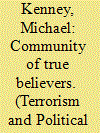

|
|
|
|
|
| Summary/Abstract |
This paper applies the concept of “communities of practice” to al-Muhajiroun (“the Emigrants”), an outlawed activist network that seeks to create an Islamic caliphate in Britain and the West through activism and proselytizing. Responding to recent studies on terrorism learning and adaptation, the author argues that focusing exclusively on the outputs of learning is unsatisfactory. Instead scholars should analyze learning as a process and unpack the causal mechanisms behind it. To support his within-case analysis, the author draws on extensive field work, including interviews and ethnographic observation. Newcomers to al-Muhajiroun learn the community’s norms and practices through repeated interactions with more experienced activists. These interactions take place in study circles and through companionship. Activists also learn by doing, preaching the Emigrants’ Salafi-Islamist ideology at da’wah stalls and protesting against the West’s “war on Islam” at demonstrations. The more they do, the better they become at performing the network’s high-risk activism, and the more deeply committed they become to its community of practice. However, far from allowing activists to adapt seamlessly to all challenges, the Emigrants’ insular and dogmatic community of practice creates its own problems, hindering its ability to innovate, expand, and thrive in an increasingly hostile environment.
|
|
|
|
|
|
|
|
|
|
|
|
|
|
|
|
| 2 |
ID:
171558


|
|
|
| 3 |
ID:
163433
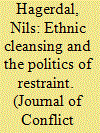

|
|
|
|
|
| Summary/Abstract |
What happens when an armed group has military incentives to engage in ethnic cleansing, but political incentives to abstain? I argue that militants can solve this dilemma by collecting intelligence that allows them to discriminate between neutral and militant non-coethnics and target only the latter. Armed groups are better able to do so in intermixed areas, where loyal coethnics provide intelligence, and thus more likely to perpetrate selective violence in such locations. Homogenous, non-coethnic enclaves are more susceptible to ethnic cleansing as armed groups often have little choice but to use ethnicity as proxy for political loyalties. I elaborate and test this argument using an original data set and extensive interviews on a critical case in the literature on ethnic cleansing: the Lebanese civil war of 1975 to 1990.
|
|
|
|
|
|
|
|
|
|
|
|
|
|
|
|
| 4 |
ID:
171068
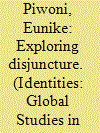

|
|
|
|
|
| Summary/Abstract |
This paper addresses current debates around elites, education and cosmopolitanism. It studies disjuncture (and interaction) between cosmopolitan practices and aspirations on the basis of 24 interviews with international students at a British elite university. Specifically, the article discusses four cases of elite students’ use of cosmopolitanism by drawing on Ann Swidler’s concepts of ‘strategies of action’ and her distinction between ‘unsettled’ and ‘settled’ lives. The case studies demonstrate that individuals, who find themselves in an unsettled phase of their life, may mobilise cosmopolitanism either to set themselves new life goals or to closely examine their lives. In settled lives, cosmopolitanism may be integrated in established strategies of action but it may also be used to (rhetorically) defend a stable orientation. This typology of four different ways of using cosmopolitanism complements previous research by exploring in depth the various forms in which ambivalences of students’ engagements with cosmopolitanism may arise.
|
|
|
|
|
|
|
|
|
|
|
|
|
|
|
|
| 5 |
ID:
142529
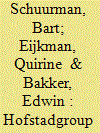

|
|
|
|
|
| Summary/Abstract |
Despite the Dutch Hofstadgroup's status in the literature as a prime example of a homegrown Salafi-Jihadist terrorist network, the authors, using newly available primary sources, argue that this classification is to a large extent unwarranted. The lack of a rudimentary organizational structure, the existence of divergent views on the legitimacy and desirability of political violence, and the absence of collective action in pursuit of a violent goal rule out labeling the Hofstadgroup as a terrorist organization or network for the largest part of its 2002–2005 existence. A smaller subgroup of extremists did begin developing into a proto-terrorist inner circle from late 2003 onwards. In 2004, this extremist core brought forth the murderer of filmmaker Theo van Gogh. But it was only in 2005, when the remnants of the inner circle tried to resuscitate the Hofstadgroup in the wake of the arrests that had followed Van Gogh's death, that these individual actions were replaced by the communal efforts necessary to warrant the “jihadist network” label often ascribed to the Hofstadgroup. Arguably the most archetypical aspect of the Hofstadgroup case is its ability to illustrate the deleterious effects of the ongoing scarcity of primary sources-based research on terrorism.
|
|
|
|
|
|
|
|
|
|
|
|
|
|
|
|
| 6 |
ID:
092973


|
|
|
|
|
| Publication |
2009.
|
| Summary/Abstract |
The Republic of Kiribati is a small, highly infertile Pacific Island nation and is one of the most challenging locations to attempt to support dense urban populations. Kiribati, like other nations in the Pacific, faces an urban future where food insecurity, unemployment, waste management and malnutrition will become increasing issues. Homegardening is suggested as one way to address many of these problems. However, the most recent study on agriculture production in urban centres in Kiribati shows that, in general, intensive cultivation of homegardens is not a common practice. This disparity between theory and practice creates an opportunity to re-examine homegardening in Kiribati and, more broadly, in the Pacific. This paper examines the practice of homegardening in urban centres in Kiribati and explores reasons why change has or has not occurred through interviews with homegardeners and government/donor representatives. Results show that homegardening has increased significantly in the past five years, largely because of the promotion of homegardens and organic composting systems by donor organisations. While findings further endorse homegardening as an excellent theoretical solution to many of the problems that confront urban settlements in Kiribati and the Pacific, it raises additional questions regarding the continuation of homegarden schemes beyond donor support programmes.
|
|
|
|
|
|
|
|
|
|
|
|
|
|
|
|
| 7 |
ID:
149111


|
|
|
|
|
| Summary/Abstract |
This article uses psychoanalytic object relations theory to construct a way to understand why interviews in IR research—viewed here as encounters between strangers—can be felt as “catastrophic.” The theory supports critical theoretical approaches that suggest that the world is structured through self–other relations and argues that encounters with “others” are unsettling because they can undermine the ways we constitute ourselves in relation to the wider world. Yet such challenges are inevitable if research is to challenge existing object constructions and the power relations that attend them. The article illustrates this argument with a detailed discussion of research interviews conducted in Zimbabwe.
|
|
|
|
|
|
|
|
|
|
|
|
|
|
|
|
| 8 |
ID:
144665
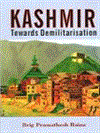

|
|
|
|
|
| Publication |
New Delhi, Pentagon Press, 2016.
|
| Description |
xv, 262p.hbk
|
| Standard Number |
9788182748767
|
|
|
|
|
|
|
|
|
|
|
|
Copies: C:1/I:0,R:0,Q:0
Circulation
| Accession# | Call# | Current Location | Status | Policy | Location |
| 058637 | 355.02130546/RAI 058637 | Main | On Shelf | General | |
|
|
|
|
| 9 |
ID:
188988
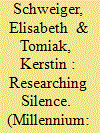

|
|
|
|
|
| Summary/Abstract |
The role of silence has received increasing attention in International Relations, ranging from silence as exclusion to secrecy and performance. Yet, there has been little effort to draw together a more practical, methodological inquiry into silence and how to engage with it in the research processes. This article builds on existing studies on silence and our own research experiences in conducting interviews and text analysis to interrogate the role silence plays in the research process. It aims to develop methodological tools for engaging with silence and offers a practical guide to analysing it from the data generation stage to the interpretation of silence. In doing so, it also contributes to attempts to redefine the meaning of silence in International Relations by including silence as more than an absence.
|
|
|
|
|
|
|
|
|
|
|
|
|
|
|
|
| 10 |
ID:
177112
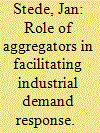

|
|
|
|
|
| Summary/Abstract |
Industrial demand response can play an important part in balancing the intermittent production from a growing share of renewable energies in electricity markets. This paper analyses the role of aggregators – intermediaries between participants and power markets – in facilitating industrial demand response. Based on the results from semi-structured interviews with German demand response aggregators, as well as a wider stakeholder online survey, we examine the role of aggregators in overcoming barriers to industrial demand response. We find that a central role for aggregators is to raise awareness for the potentials of demand response, as well as to support implementation by engaging key actors in industrial companies. Moreover, we develop a taxonomy that helps analyse how the different functional roles of aggregators create economic value. We find that there is considerable heterogeneity in the kind of services that aggregators offer, many of which do create significant economic value. However, some of the functional roles that aggregators currently fill may become obsolete once market barriers to demand response are reduced or knowledge on demand response becomes more diffused.
|
|
|
|
|
|
|
|
|
|
|
|
|
|
|
|
| 11 |
ID:
165701


|
|
|
|
|
| Summary/Abstract |
The contribution introduces the concept of ‘organised disintegration’. Based on an interview study conducted in Germany, the concept describes the life situation of asylum seekers and ‘tolerated’ refugees. At first, the theoretical references to the ‘total institution’ and ‘conduct of everyday life’ approaches are explained. ‘Work’ appears in the results as an arrangement of the refugees’ conduct of everyday life that is characterised by joblessness and futile search for employment. The refugees experience work as prohibited and their persistent situation as lost lifetime and as ‘human death’. At the same time, the arrangement of work is maintained as a meaningful part of ‘real life’ which begins immediately after overcoming the current legal status. The validity of the concepts that were made relevant as well as the implications for the current state of research in refugee studies are discussed in the conclusion.
|
|
|
|
|
|
|
|
|
|
|
|
|
|
|
|
|
|
|
|
|